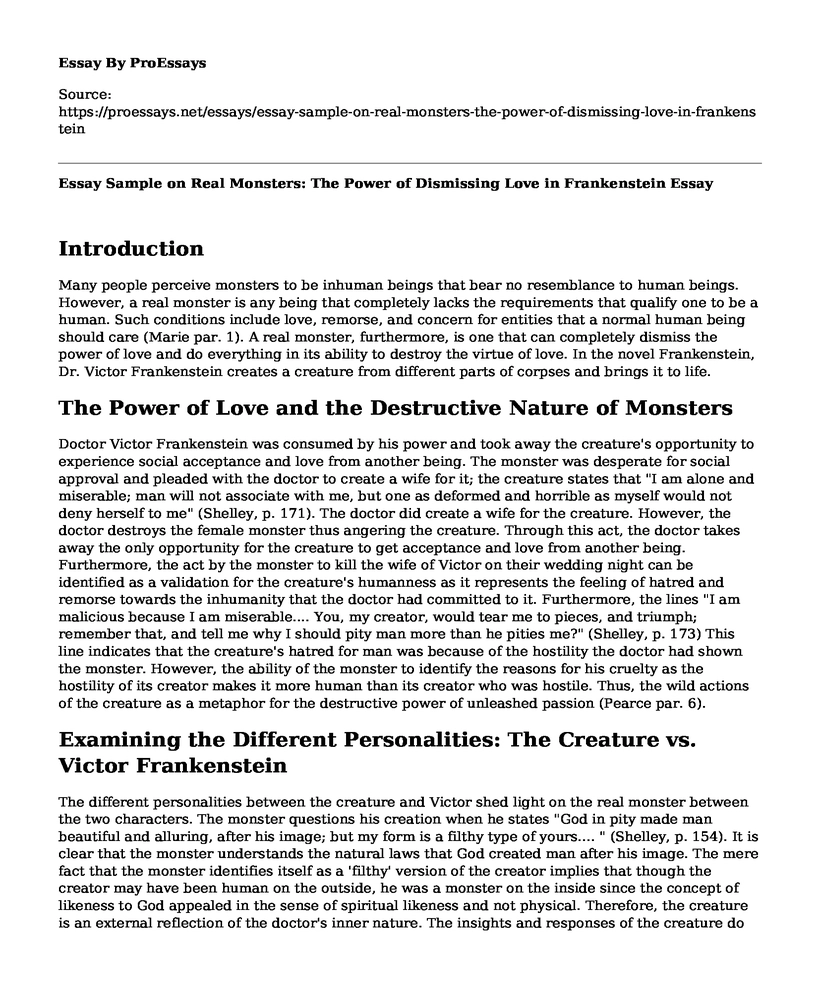Introduction
Many people perceive monsters to be inhuman beings that bear no resemblance to human beings. However, a real monster is any being that completely lacks the requirements that qualify one to be a human. Such conditions include love, remorse, and concern for entities that a normal human being should care (Marie par. 1). A real monster, furthermore, is one that can completely dismiss the power of love and do everything in its ability to destroy the virtue of love. In the novel Frankenstein, Dr. Victor Frankenstein creates a creature from different parts of corpses and brings it to life.
The Power of Love and the Destructive Nature of Monsters
Doctor Victor Frankenstein was consumed by his power and took away the creature's opportunity to experience social acceptance and love from another being. The monster was desperate for social approval and pleaded with the doctor to create a wife for it; the creature states that "I am alone and miserable; man will not associate with me, but one as deformed and horrible as myself would not deny herself to me" (Shelley, p. 171). The doctor did create a wife for the creature. However, the doctor destroys the female monster thus angering the creature. Through this act, the doctor takes away the only opportunity for the creature to get acceptance and love from another being. Furthermore, the act by the monster to kill the wife of Victor on their wedding night can be identified as a validation for the creature's humanness as it represents the feeling of hatred and remorse towards the inhumanity that the doctor had committed to it. Furthermore, the lines "I am malicious because I am miserable.... You, my creator, would tear me to pieces, and triumph; remember that, and tell me why I should pity man more than he pities me?" (Shelley, p. 173) This line indicates that the creature's hatred for man was because of the hostility the doctor had shown the monster. However, the ability of the monster to identify the reasons for his cruelty as the hostility of its creator makes it more human than its creator who was hostile. Thus, the wild actions of the creature as a metaphor for the destructive power of unleashed passion (Pearce par. 6).
Examining the Different Personalities: The Creature vs. Victor Frankenstein
The different personalities between the creature and Victor shed light on the real monster between the two characters. The monster questions his creation when he states "God in pity made man beautiful and alluring, after his image; but my form is a filthy type of yours.... " (Shelley, p. 154). It is clear that the monster understands the natural laws that God created man after his image. The mere fact that the monster identifies itself as a 'filthy' version of the creator implies that though the creator may have been human on the outside, he was a monster on the inside since the concept of likeness to God appealed in the sense of spiritual likeness and not physical. Therefore, the creature is an external reflection of the doctor's inner nature. The insights and responses of the creature do not make it the monster. Therefore, all references to monstrosity can be identified as the doctor's black heart (Thripp par. 7).
Conclusion
In conclusion, it is clear from the beginning of the book, a glimpse into the 'so-called' monster unfolds to reveal that the true monster is indeed the doctor and not the creature he created. The creature eventually evolves into a being that is articulate and can think logically. More importantly, the creature proves that it is capable of love, unlike its creator who portrays the characteristics of a true monster.
Works Cited
Marie, A. "Frankenstein: The True Monster." 23 Apr. 2014, owlcation.com/humanities/Frankenstein-Invention-vs-Inventor.
Pearce, J. "The Misunderstood Monster | Joseph Pearce | From the Introduction to Mary Shelley's "Frankenstein." 8 Oct. 2008, www.ignatiusinsight.com/features2008/print2008/jpearce_frankenstein_oct08.html.
Shelley, M. W. Frankenstein. Prestwick House, 2005.
Thripp, R. "Victor Frankenstein: Trodden Hero or Veiled Villain? | Thripp Photography." 20 Feb. 2008, richardxthripp.thripp.com/2008/02/frankenstein-hero-or-villain/.
Cite this page
Essay Sample on Real Monsters: The Power of Dismissing Love in Frankenstein. (2023, Jan 09). Retrieved from https://proessays.net/essays/essay-sample-on-real-monsters-the-power-of-dismissing-love-in-frankenstein
If you are the original author of this essay and no longer wish to have it published on the ProEssays website, please click below to request its removal:
- The Significance of the Title 'Fences' Essay
- Hidden Figures, the Silence in Audacity Essay
- Critical Essay on Mary Shelley's Frankenstein: Exploring Human Nature's Darkest Fears
- Criticism and Analysis of Hamlet
- Tragic Cultural Literacy: Understanding Biblical Poetry - Essay Sample
- The Chimney Sweeper: William Blake's Poem of Innocence - Essay Sample
- Essay Sample on Myths of Ancient Greece: Gender Roles & Stereotypes







